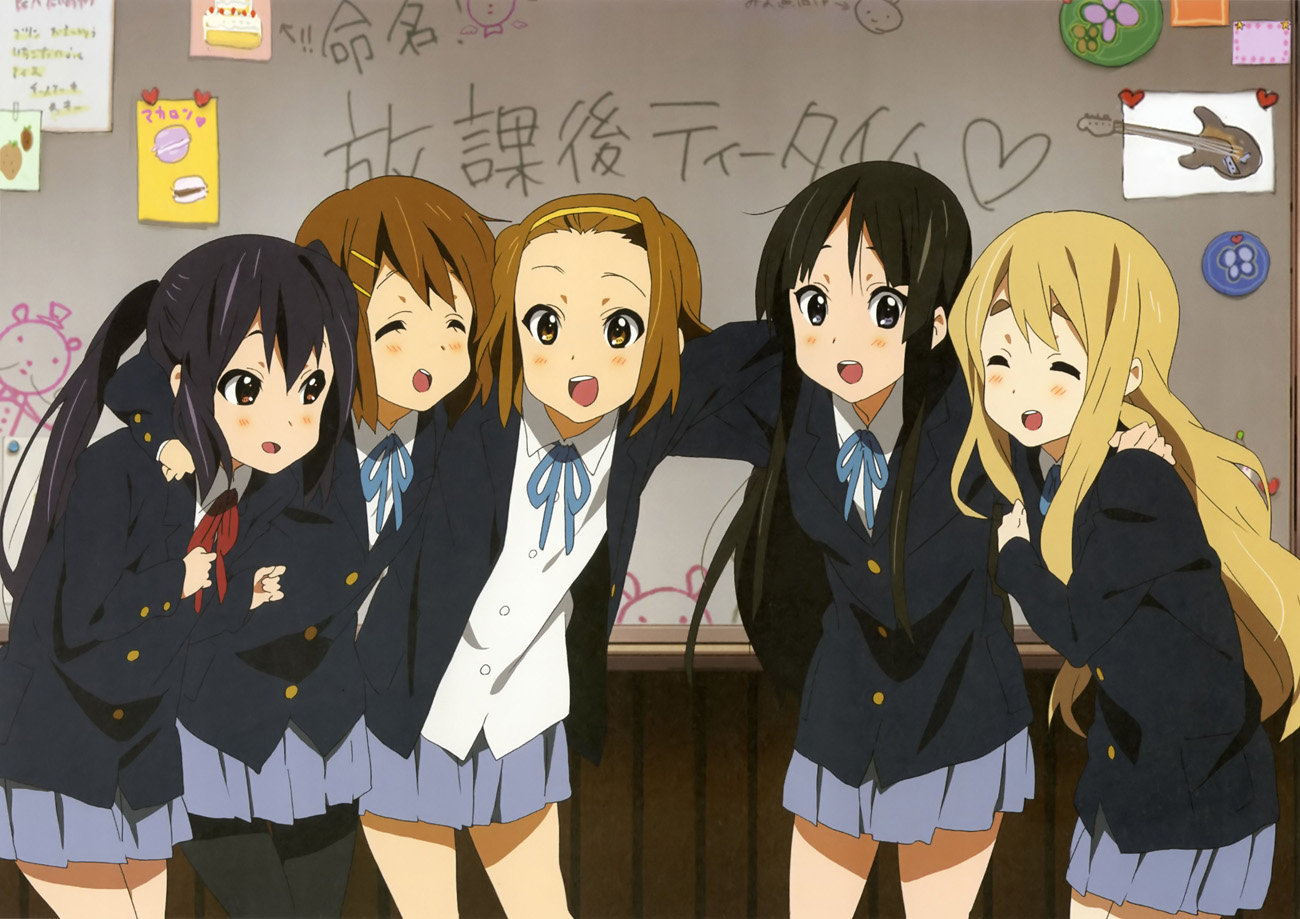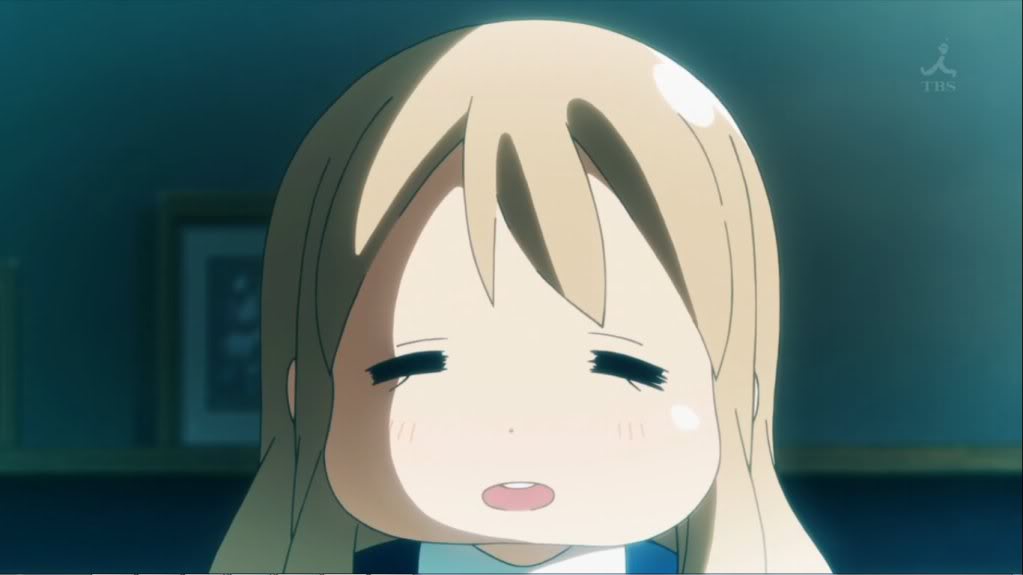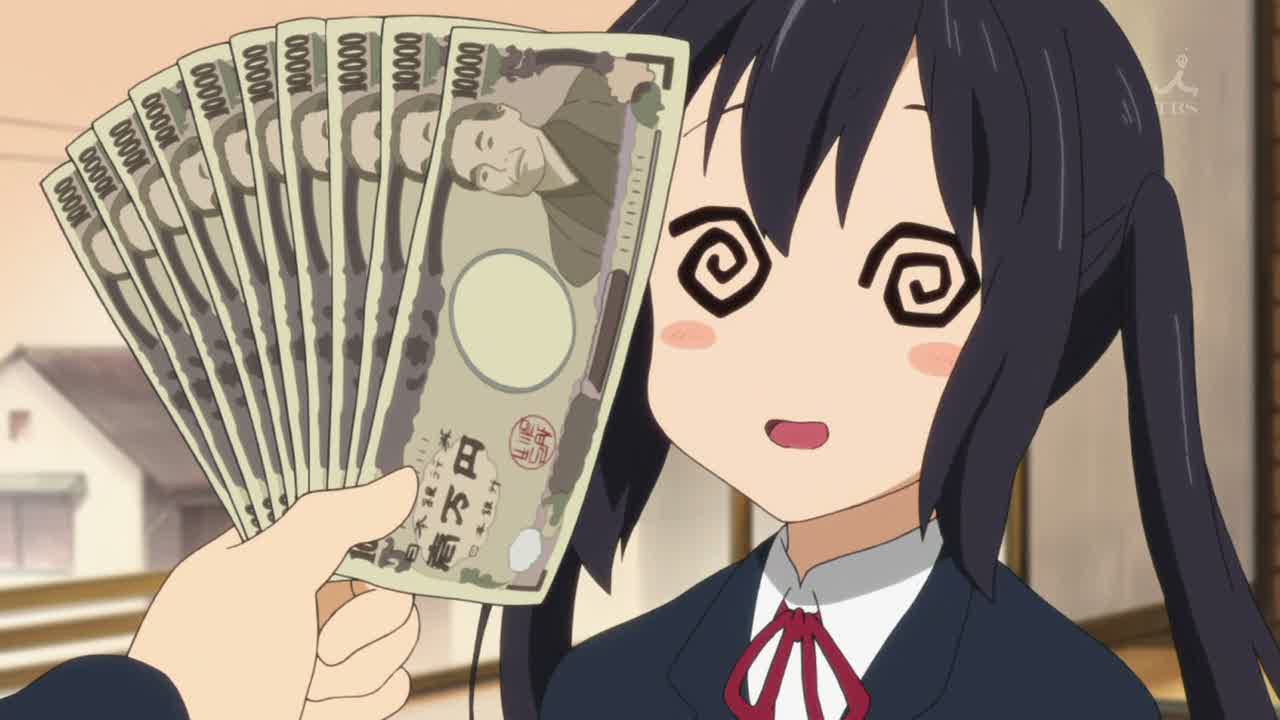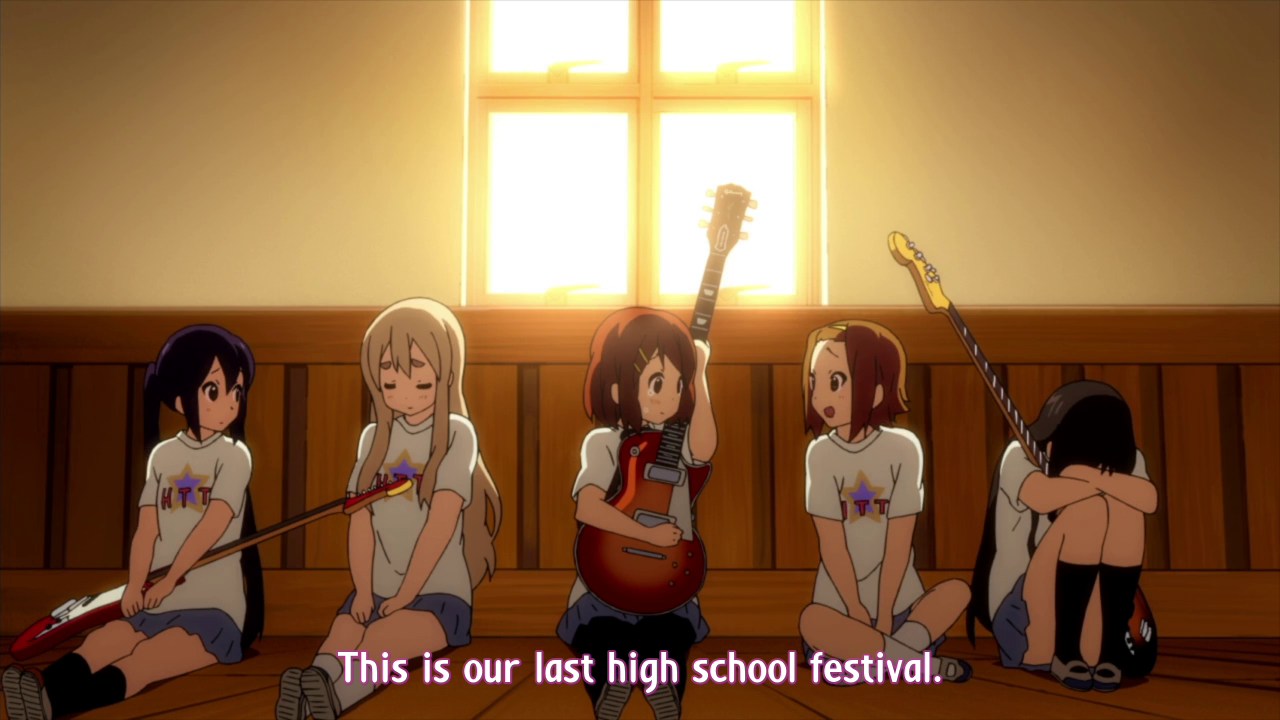
Is this a hot take?
K-On! is a Moe Hellscape
Let's get the obvious out of the way: my "Why Against Moe?" article used the K-On! girls for its featured image. The series—a pseudo-comedy about a high school band that spends more time goofing off and enjoying snacks than it does engaging with music—is an iconic entry in the subgenre of anime sometimes referred to as "moeblob," a metonymic label that paints an entire work in the color of its main contents: characters who lack defining traits besides their moe traits. Some would argue that K-On!'s cast is comprised entirely of these non-characters, and that K-On! as a show has no substance, perhaps even no value.

I was one of these folks on the day K-On! began airing. (It would not have survived the rigor of my current First Glance category.) I derided it and mocked those who claimed to like it. This isn't so much an essay about how I was quick to jump to conclusions. I am not here to prostrate myself and apologize for being "wrong." To this day I hold that the first episode—much of the first season, even—was relatively low effort, and somewhat low value. Those who criticized it out the gate weren't failing to enjoy the show's charm. We were confronted primarily with the show's use of moeblob characters, and our opponents in debate, the viewers and bloggers defending the show, couldn't point to anything good about the show except for some poorly-written jokes and, of course, the moeblob characters, which of course appeal to some audiences. (There might have been one guy who liked the music, but there's always one guy with an Opinion.)
So, as was perhaps inevitable, the argument over K-On!'s merits devolved into an argument over the merits of moeblob. I didn't continue watching the show. Some people did. They were wrong, I thought, and I wasn't alone in this. Today K-On! is still widely considered a moeblob cash cow, an illustration of many of the flaws in the anime industry. It was wildly popular on bad grounds, according to dozens of memes contrasting the "meaningful substance" of Yamakan1 shows with the "meaningless moe" of Kyoto Animation2 titles.

My attitude changed one year at Fanime. I was in the dumps and I stumbled into one of their marathon rooms, where K-On! was playing. I thought to myself that I could sit in the back and make fun of it, as bitter and sad people sometimes do, but two hours later I was still there, enthralled.
After that weekend, I plugged the gaps and finished K-On! at home. Later that year, K-On!!—a second exclamation mark for the second season—aired. I watched it with devotion and growing awe. K-On!! is one of my favorite anime.
What changed?
Did I become a a thrall to moe?
K-On! is Gentle
To be clear, this wasn't the first title about cute girls doing relatively little with which I had fallen deeply in love. My all-time favorite anime is Aria, after all, and while there are a loooooot of differences, there are some key similarities. Both are just slightly comedic—they have jokes that don't make you laugh out loud, or even giggle: they have jokes that make you smile. Both are kind of about girls getting better at what they do, but the pace of this narrative is slow, and many episodes are sidetracks from it. Both embrace the importance and transience of moments. And both have cats, if you count Azunyan.

(The most apparent difference is that while Aria focuses on atmosphere and discovery, K-On! focuses on tea and cutesy hijinks.)
K-On! changes considerably over its run. The first season is a more faithful adaptation of the source material, at least in terms of form. The source is a 4-panel comic, and you can feel it when you watch the show. Almost every interaction or gag fits the four-panel pace, almost belligerently so. Conversations don't play out like real conversations, rather like a series of individual exchanges. This leads to a disjointedness, and also places more emphasis on the attempts at comedy, which again, are quite weak. This is all that the show presents initially, so I forgive myself for my early judgments: they make sense.
But like most good things, K-On! isn't static. It has actual characters, and even if they are primarily composed of moe traits, there's more to them. They themselves are dynamic, and they can grow on the viewer as we see them snack and weather minor struggles. By the time the second season comes around, the audience is already at least mildly invested in the girls.
And then things slow down.
Way down.
K-On!'s first season is thirteen episodes, and it covers the girls' first two years of high school.
K-On!! is twenty-six episodes, and it covers their third and final year of high school.
Gone is the punchy 4-panel pacing. In its place, a leisurely and sometimes melancholic stroll through what becomes an extremely emotional year for the girls. This would fall flat if the first season hadn't been what it was. Instead, we know these girls, we know how they approach life, and we get to see them struggle with their own changes (will the club survive when they graduate?). We get to follow them much more intimately. K-On! feels like a superficial rush next to its successor.
Most crucially to the point I want to make today, K-On!! vastly deepens the girls' characters. They begin to act outside the bounds defined by their moe traits. Occasionally they simply defy expectation, but more often they explicitly work at changing themselves. There's an episode where Ritsu, the drummer, decides she's done with drums and wants to explore other instruments. There's an episode where Yui, the lead guitarist and vocalist—the blobbiest and least professional of the group—decides she needs to step up her attitude and become less blobby in order to attract new members to the band, for her underclassman's sake. The second season is full of these gems, and they're incredibly delightful.
Beyond these individual episodes, though, there is the overarching development of Yui, and this is the crux of the show in my opinion.
Hirasawa Yui
If K-On! has a main character, it's Yui. She joins the band at the beginning of the series under somewhat false pretenses. She is told she is merely needed as a paper member to keep the club active, and she is plied with tea and sweets by three other girls who are much more serious about music. Gradually, she becomes interested in music, learns guitar, and becomes an integral part of the band, but along the way, she seems to drag everyone else down a bit. She isn't disciplined. She isn't professional. Club activities devolve into tea parties. Practice time becomes snack time. The simplest explanation for her lackadaisical attitude, her apparent laziness, her cutesy relationship with her guitar3, her horrible performance at school, and her one-track mind for cake, is that all these things are moe elements. It's easy to list all these things, and they certainly can be read as moe elements.

But they aren't played purely for moe.
They could have been. There are countless shows with inept, clumsy, cutesy characters, and most of them don't go anywhere. K-On!! could have left Yui alone, left it at jokes about overeating and failing exams. But it doesn't. Instead of leaving her alone, it passes judgment on her. The show draws up a balance sheet for Yui. It analyzes her value.
This is done in what I believe to be the show's strongest episode: "Yet Another School Festival," in which the girls perform their final set for their school's annual festival. Toward the end of the series, it's an episode full of nostalgia, and full of acknowledgment. Several minutes are spent on thank yous alone, with Yui and the other members of the band thanking their advisor, friends, audience, and even their club room. Between songs, Yui introduces the other band members. This isn't the first time she's done this, and it's fairly rote. This is Mio, on the bass; this is Ritsu, on the drums; and so on. Being Yui, she also gives each of her bandmates a somewhat awkward thank you: Mugi for tea! Azusa for teaching her how to be better at guitar even though Azusa is younger!
Yui doesn't introduce herself.
Mio points this out, and then the band members go in a circle saying something about Yui. This is the balance sheet.
Ritsu: She's what she looks like, a slow airhead.
Mugi: She goes all out, and really tries her best.
Mio: She gives energy to the people around her.
Azusa: She's a very reliable senpai.
Ritsu says what has been known since episode one. This is the dead horse side of Yui.
Mugi says something apparently contradictory, but true: Yui tries hard sometimes. Not all the time, mind you, but she does do her best. We've seen it in a few episodes, like when she learned to sing while playing the guitar, or when she pulled through on her exams that one time. She practices guitar like there's no tomorrow, and she does go all out on a lot of seemingly useless fronts: cake, tea, cute things.
Mio puts into words something that is also obvious once you've heard it, but at this point had yet to be vocalized in the show—something that challenges the "uselessness" to which I just referred. Yui, without knowing it or meaning to, has become the lifeblood of their band. Her "flaws" defined the band's schedule and aspirations, but not necessarily for the worse: their band is a cutesy tea & cake band. And the other members like it. The whole school likes it. They're popular, beloved. And this isn't just Yui's moe elements drawing in the entire community. She is a deeply loving, compassionate person. Beneath all her silliness is an impeccable tenderness. She's ironically nurturing.
And this is what Azusa recognizes with the most surprising of the comments. Azusa is a year younger, and plays the same instrument as Yui. She is way better at guitar, and is constantly teaching Yui. In some respects, their relationship is upside down: Yui should be teaching and guiding Azusa, and not the other way around. This is a recurring joke in the show. Azusa is the mature one, the serious one. Yet here she is complimenting Yui on being a caretaker, instructor, guide, role model. Yui is surprised—flabbergasted—and we might be, too, if it didn't make perfect sense.
Yui isn't just a collection of moe elements. The way in which her world interacts with her indicates that there's more there. The fact that other characters tangle with her essence means that there's something to engage with. She's not just a punchline, or a moe fantasy. She's a deep and well-fleshed out character with a lot of attributes that a profit-oriented society might call "flaws"—her apparent laziness, her bumbling, and so on. Along with these "flaws," she has strengths. She isn't good at paying attention in class, but she's good at other things. Her problems with attention, schoolwork, and discipline are never defined or given a label in the show, but we can imagine that she might have a learning disability, or ADHD, or maybe she struggles with executive function. I'm obviously not in a position to give a diagnosis, but if we imagine Yui as a real person instead of a moeblob, she's probably not neurotypical.
Not only do her friends love her, people who don't know her that well love her. They recognize her abilities, and celebrate them.
Anime trends toward ableism; when disability isn't a bad thing, it's usually fetishized and used as a turn-on. Several of the more prominent behavior moe elements—perhaps most notably yandere—are disturbingly insensitive mental illness kinks. Problems of the body and mind aren't denied sympathy in anime, but they are usually treated as either defining tragedy or exotic appeal. Very few works recognize different ability, much less the inherent value thereof.
That K-On! treats Yui the way that it does is kinda really cool.
Sure, the treatment could be better—K-On! could be better! If this were intentional and not merely my reading, it would have been nice if the show had given Yui a label, both to make explicit its intent with her character and to destigmatize the label. It would have been nice if the first season had brought more substance, and it would have been nice if the show had gone a little less hard in the moe paint. But I spend enough of my blog posts complaining.
As someone who lives with disability, the character of Yui speaks to me, and the episode where it becomes clear that the show values her for more than her moe appeal is one of my favorite episodes of any show. Just rewatching that scene while writing this brought me to tears. And maybe my expectations of anime are super low, but in 2010, that was enough.

This is an interesting take, ableism… I certainly never crossed my mind.
I agree with everything.
Furthermore, I have been one of the shoe’s first, and unlikeliest fans and defenders. I loved it then and I love it now, for much of the same reasons.
And there’s this other thing that I’m learning in my middle age (I’m 41 now. I started my anime blog around 10 years ago): I’m sentimental, and getting more so. Or, I always was, only now I don’t give a fuck about appearing otherwise. Sentimentality isn’t cool, isn’t edgy. Being maudlin and melodramatic, or an appreciation of such, never gives one credibility even as a casual critic. Well fuck that. My sentimentality comes from a real place: whether it’s for a childhood or adolescence that never was as good as I wished it to be and yet had the moments that made me hunger for more, failed romances, lost friendships… They’re all there. I love it that they’re mine, even the absences and privation. I remember.
I cry at shows. Episodes, films. They’re all often not cool or edgy material. More and more I let these things kill me.
K-On!! eviscerated me back when I had all the barriers up. I had all the pretenses and all the posturing. Goddamn Yui. I’ll never not love this show.
I feel you. Obviously we’re in different places in life, but I too have changed a lot in the intervening ten years 😛 And honestly the number one for me I think could be boiled down to ‘change in friendship.’ Friendships deepening, or ending—I cry. K-On!! had me crying from the school festival arc onward, to the the blackboard that Sawako can’t erase, to the girls touching the turtle’s back one last time on their way down the stairs. And it’s not just this series.
Thanks for sharing! Goddamn Yui.